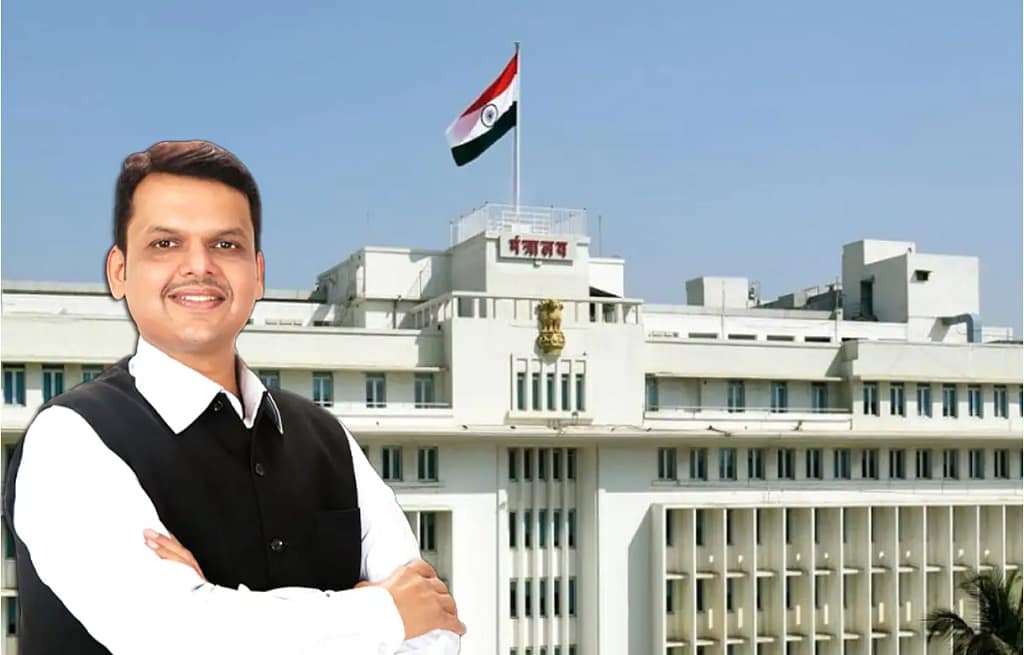A CM, being the head of the state, assumes the responsibility of piloting the state for the better. He or she becomes the face of the state during their tenure. Their decisions, steps, indecisions, and procrastination create the image of the government and impact the present and future of the state. A visionary and dynamic CM is a rare combination that takes the state to new heights of prosperity through reforms and transformation.
The period during the regime of Devendra Fadnavis between 2014 and 2019 is termed by many the golden era in modern Maharashtra since this was the time when people saw reforms in multiple sectors, ambitious new infra projects, fast implementation of vital projects after releasing them from cold storage, big ticket programs to transform agriculture, farmers’ lives, and rural economies, law to punish officers for refusing governance to the common man, empowering the villagers through training and digital technology, topping the FDI and domestic investment inflows for successive years, APMC reform, water grid project for water supply to drought-hit districts, smart city, urban development, and many more. Here are some of the most impactful decisions made by Devendra Fadnavis that have given the state a significant push:
Right to Service Act
A government is formed to provide good governance to common people by means of public services. But due to corruption, inefficiencies, and apathy of the concerned government employees, many a time the public services do not reach the common man. Whether a poor family needs to be on the BPL list or a person wants a driver’s license, there is too often a bribe to be paid, or there will be inordinate delays, or even chances of not receiving the document, forcing one to go through the process again.
After becoming the CM, one of the early initiatives of Devendra Fadnavis was to ensure good governance by implementing a strict law. The Maharashtra Right to Public Services Act, 2015 was introduced by his government to take legal action against corrupt officials. It ensures the timely delivery of public services by the government to its citizens and offers a framework for penalizing government officials who fail to deliver the services stipulated under the statute.
Jalyukta Shivar Abhiyan
It was the biggest ever drought control program in the country, taken by the Fadnavis government just after coming to power. The program has resulted in 100% water saturation in 20,544 villages, creating an aggregate storage capacity of 27.08,297 TCM. As a result, the state’s irrigation potential increased to 39,04,394 hectares. Despite insufficient rainfall between 2014 and 2018, effective implementation of the Jalyukt Shivar Abhiyaan has managed to stabilize ground water levels. Aside from improving rainwater harvesting in the villages from various means, removing silt from dams and other water bodies helped raise groundwater levels. During the same era, a comparative assessment of the water level in wells in the state revealed an increase of 0.56 percent between 2014 to 2018. From 2015 to 2019, the Jalyukt Shivar Abhiyan conducted 6,32,896 works in 22,593 villages.
The Nagpur-Mumbai Mahamarg
This was another mammoth project taken up by Fadnavis to fulfill his dream of bringing the interior of Maharashtra into the fast lane of development. The Nagpur-Mumbai Super Expressway directly connects ten districts of the state and enables farmers to get their goods directly to the cities for better prices, as well as to create new industries in rural areas, prevent migration from there, and promote overall economic development in that region. This expressway is connected to JNPT on one end and MIHAN in Nagpur on the other, providing ample scope for farmers and rural industries to export their products via water or air. A dream that was seen 20 years ago is now a reality. Areas like Vidarbha and Marathwada now have superior surface connectivity and immense opportunities for flourishing.
The Ease of Doing Business
The Ease of Doing Business(EoDB) is a ranking system created by the World Bank to evaluate the business and investment environment prevailing in a country, in comparison with other countries. The EoDB index is an important factor that influences foreign investors. Mumbai and Delhi are the two cities considered by the World Bank for deciding India’s EoDB rating. Earnest efforts by the Fadnavis government and the central government saw India jump 79 points up in the list from 142 (2014) to 63 (2019).
The Fadnavis government took several steps to scale up the investment environment in Maharashtra. For example, Shaktipradan Cell was formed to get all the permissions required to set up the industry within a month. The changes in the state policy were made in line with the changes taking place globally in specific areas. The new IT-enabled Services Policy, 2015 was implemented to promote the growth of the IT and ITES sectors. At the same time, a facility was created to make all permissions available at one place through the ‘Maitri’ web portal for investors investing more than Rs 100 crore.
In 2016, the Directorate of Industries introduced Maharashtra Industry, Trade, and Investment “MAITRI” to support and guide investors interested in investing in Maharashtra. The number of different types of permissions required to be obtained from the state to start an industry was reduced from the earlier 67 to just 5 by the Fadnavis government.
The MAITRI platform, which serves as the State Single Window System for the various Government-to-Business (G2B) approvals needed for industrial setup in Maharashtra, has successfully processed more than 290,000 applications to date. Investors have access to 119 services across 15 departments through the MAITRI portal. The Maharashtra Industry, Trade, and Investment Facilitation Act, “MAITRI Act,” came into effect on July 3, 2023, marking a significant step towards making Maharashtra more business-friendly and boosting the state’s position in trade and investment.
Marathwada Water Grid project
The Marathwada, the largest region in Maharashtra, with its 8 districts spanning over 64.5 thousand sq. km. and nearly 2 crore population, was historically considered one of the most drought-prone areas in the country. Apart from its agricultural woes, this vast area used to reel under heavy scarcity of drinking water for most of the year. While Jalyukta Shivar Abhiyan was designed to address the agricultural problems of the region, Devendra Fadnavis was looking for a sustainable solution for its drinking water problem.
The Marathwada watergrid project was undertaken by the Fadnavis government in 2019, to supply water for domestic and industrial uses from far via a piped network interconnecting dams. It was a technology driven project that was to be implemented by an Israeli company. However, the project was cancelled by the MVA government that ruled the state for the next two and half years, but fortunately, with Devendraji back in power, the Marathwada WaterGrid project has been revived.
Chhatrapati Shivaji Maharaj Shetkari Samman Yojana
Farmers’ income usually depends on good harvesting. But if that doesn’t occur for successive years due to drought, hailstorms, etc., the situation often compels them to take loans that they cannot pay back if the bad time persists, or they have to take a new loan to repay the existing loan, thus getting trapped in a loan cycle. The series of suicides by farmers in Maharashtra that we often hear is a tragic result of such situations. Devendra Fadnavis announced a historic loan waiver scheme in 2017, the first time ever in Maharashtra, to provide relief to the farmers. Named after Chhatrapati Shivaji Maharaj, the founder of Hindavi Swarajya, Devendraji announced ‘Chhatrapati Shivaji Maharaj Shetkari Samman Yojana – 2017’ to waive off or buy back loans of the farmers. Lives of nearly 40 lakh farmers were significantly impacted by this loan waiver yojana as dignity and happiness returned to their families through complete loan waiver. It was decided to waive off individual loans up to Rs 1.5 lakh and offer a settlement scheme for loans above 1.5 lakh, taken between April 1, 2012 and June 30, 2016. Through this scheme, Rs. 34000 crore worth of loans taken by 89 lakh farmers were waived off. An additional subsidy of Rs. 25000 was given to those farmers who had a good track record of repaying loans regularly.
1% reservation for orphans
Orphan children often face significant social and economic disadvantages due to their lack of parental support, making it difficult for them to access quality education and employment opportunities without additional assistance. A 1% reservation for orphans provided by the Fadnavis government essentially gives them a leg up in education and jobs, provides them a level playing field, and promotes their inclusion in society. Also, his government relaxed rules for orphan children, such as government identification, birth certificates, or residential proofs, which are otherwise compulsory for general students to access higher education or employment opportunities.
Maratha Reservation 2018
Although Maratha Aarakshan is a decades-long demand of the Maratha community, it was never taken seriously by the Congress-NCP coalition governments, which was in power for most terms before Devendra Fadnavis led BJP-Shivsena alliance government took charge in 2014. Fadnavis was the first CM who genuinely wanted to deal with this issue, going deep into the problems faced by the Marathas. In 2018, his government passed the Socially and Educationally Backward Classes (SEBC) Act, which granted 16% reservation to the Maratha community. The Bombay High Court reduced this reservation to 12% in education and 13% in jobs.
Mumbai Coastal Road’
The Mumbai Coastal Road project is an ambitious project to decongest Mumbai’s coastal areas and improve connectivity between Mumbai city and its suburbs. The idea of this project was first proposed in 1962 during a study. But its implementation was initiated after the BJP came to power in Maharashtra in 2014. It was due to the endeavors of CM Devendra Fadnavis that the Coastal Road project received all required approvals from the Central Government to start the project. After coming to power in Maharashtra, Devendra Fadnavis announced on 7 November 2014 his government’s focus on the coastal road project along with other infra projects stalled for a long time during the previous Congress-NCP Congress government. Accordingly, an agreement was signed with the Netherlands government for the Coastal Road project on 6 June 2015. After that, the work of this project was started in phases. Finally, on March 11, 2024, the ‘Mumbai Coastal Road’ project, which is considered a milestone in the progress of Mumbai, was inaugurated by Chief Minister Eknath Shinde, Deputy Chief Minister Ajit Pawar, and Deputy Chief Minister Devendra Fadnavis.
The first phase of the Mumbai Coastal Road from Marine Drive to Bandra-Worli has been opened for traffic. Located on the western coast of Mumbai, this project is reducing traffic congestion in Mumbai and helping to curb pollution. This is saving about 34 percent of fuel and 70 percent of time for Mumbaikars. This ambitious project has been named Chhatrapati Sambhaji Maharaj Coastal Road.
Transform Maharashtra:
The Transform Maharashtra initiative provides an internship opportunity for the youth of the state in government departments to learn and contribute to transforming Maharashtra. Devendra Fadnavis, who constantly strives to improve efficiency and transparency in the work of the government, started the initiative ‘Transform Maharashtra’ during his 1st term as Chief Minister, with the aim that the government should make use of the fresh perspectives and energy of the youth in the development processes. Through this activity, Devendra Fadnavis interacted with thousands of students on various issues and policies of the government of Maharashtra. For example, the Chief Minister’s Fellowship Program, introduced by the Fadnavis government, was an 11-month-long internship program in the various departments relating to governance. Bright young graduates adept in web-based procedures and networking were inducted as CM Fellows to assist in the governance procedures. This way, as the young graduates learned and earned, the government gained from their knowledge and energy.

